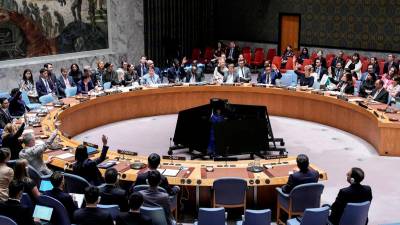VIENNA: The United Nations will reimpose comprehensive sanctions on Iran this Saturday after European powers activated a unique mechanism in the 2015 nuclear agreement.
Britain, France and Germany triggered the “snapback” provision on August 28, alleging Tehran had breached multiple commitments under the Joint Comprehensive Plan of Action.
This mechanism allows any party to the nuclear deal to restore all UN sanctions if another participant significantly fails to comply with its terms.
The 2015 accord lifted international sanctions against Iran in exchange for restrictions on its nuclear programme, with these arrangements enshrined in UN Security Council Resolution 2231.
Any participating state can file a complaint with the Security Council if they believe another signatory has violated the agreement, starting a 30-day countdown to automatic sanctions reinstatement.
European powers condemned Iran for accumulating a uranium stockpile exceeding the deal’s limit by more than forty times.
The nuclear agreement has deteriorated significantly since the United States withdrew unilaterally in 2018 under President Donald Trump and reimposed its own sanctions.
Tehran subsequently began scaling back its commitments under the accord and accelerating nuclear activities, with tensions escalating further after June’s 12-day war between Iran and Israel.
That conflict also disrupted nuclear negotiations between Iran and the United States that had commenced in April, prompting Tehran to suspend cooperation with the International Atomic Energy Agency.
Iran resumed cooperation with IAEA inspectors this month following a new agreement with the nuclear watchdog.
Iranian Foreign Minister Abbas Araghchi declared the European move “legally void and politically reckless,“ asserting that Tehran had proposed several solutions to resolve the impasse.
President Masoud Pezeshkian confirmed Iran would not withdraw from the Nuclear Non-Proliferation Treaty in retaliation for the sanctions reinstatement.
Reimposed measures will include global embargoes on ballistic missile technology, arms, nuclear equipment and banking restrictions that were lifted a decade ago.
International Crisis Group’s Iran project director Ali Vaez noted that snapback “will add to the burden of Iran’s economy, which already is in a difficult position”.
He emphasised that the actual impact “will depend on how much of the sweeping measures they provide on paper is reflected in enforcement,“ particularly since China and Russia might “try to stymie their execution”.
Arms Control Association expert Kelsey Davenport observed that “the UN measures will have little economic impact, given the breadth of US and EU sanctions already in place against Iran”.
She cautioned that reinstating sanctions “without a negotiating process in place risks Iran and the United States getting caught in an escalatory tit-for-tat”. – AFP
